The US lifts a ban on sending weapons to a controversial Ukrainian military unit
Associated Press
Updated Tue, June 11, 2024
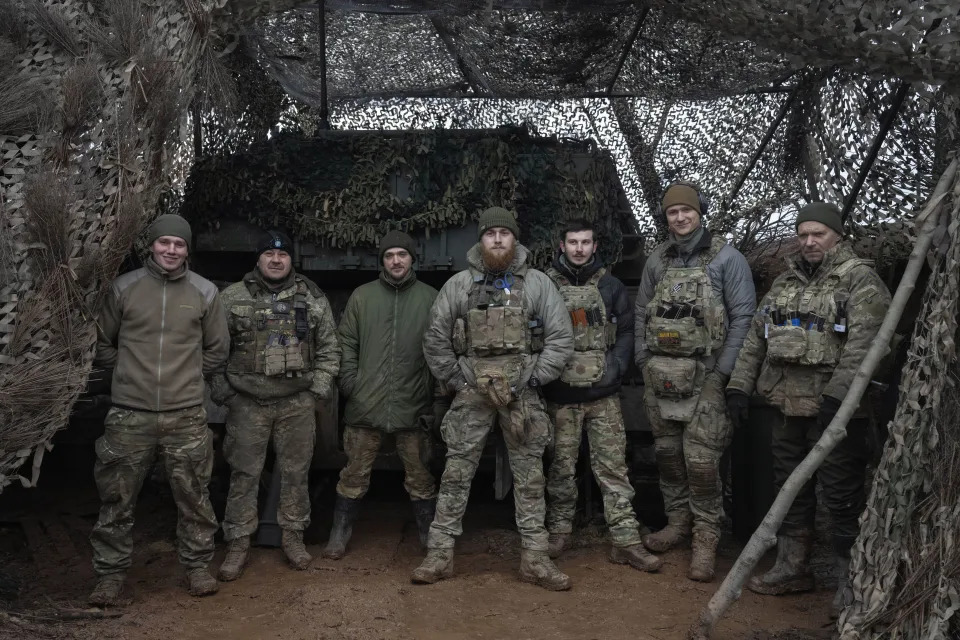
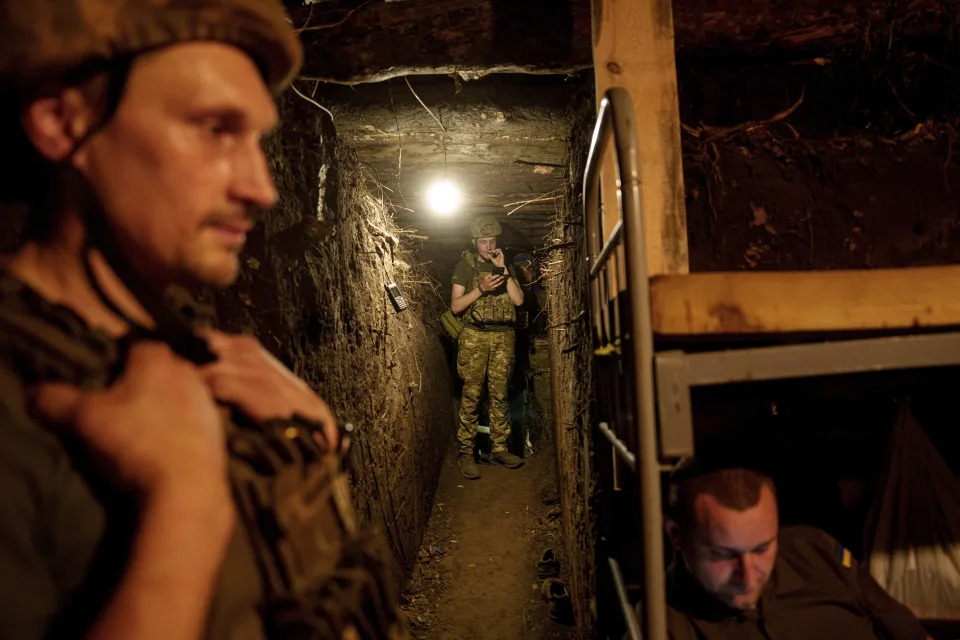
![]()
![]()
![]()
![]()
![]()
![]()
![]()
- Soldiers of 12th Special Forces Brigade Azov of the National Guard pose for a photo at the 155mm self-propelled gun M109 Paladin at the front line, near Kreminna, Luhansk region, Ukraine, Sunday, Jan. 28, 2024. The U.S. has removed restrictions on the transfer of American weapons and training to a high-profile Ukrainian military unit with a checkered past, the State Department said on Tuesday, June 11, 2024.
KYIV, Ukraine (AP) — The U.S. has lifted a ban on providing American weapons and training to a controversial Ukrainian military unit that was key to the defense of the major port city of Mariupol, the State Department said on Tuesday.
The Azov Brigade is among Ukraine’s most effective and popular fighting units but it has been dogged by its origins as a volunteer battalion that drew fighters from far-right circles and criticism for some of its tactics. The U.S. had banned the regiment from using American weapons, citing the neo-Nazi ideology of some of its founders.
The current members of the Azov Brigade, which has been absorbed into Ukraine’s National Guard as the 12th Special Forces Brigade, reject accusations of extremism and any ties with far-right movements. But the Kremlin has seized on the regiment’s origins in its efforts to cast Russia’s invasion as a battle against Nazi influence in Ukraine.
Kremlin spokesman Dmitry Peskov said Moscow took an “extremely negative” view of Washington’s decision. He described Azov as an “ultranationalist armed formation” and accused U.S. authorities of being “ready to flirt with neo-Nazis.”
U.S. law prohibits providing equipment and training to foreign military units or individuals suspected of committing gross human rights violations. The State Department said in a statement that it found “no evidence" of such violations.
“This is a new page in our unit's history,” the Azov Brigade wrote in a statement on Instagram. “Azov is becoming even more powerful, even more professional and even more dangerous for occupiers.”
“Obtaining Western weapons and training from the United States will not only increase the combat ability of Azov, but most importantly, contribute to the preservation of the lives and the health of personnel,” the statement said.
Up until the State Department’s decision, Azov was prohibited from sending fighters to Western military exercises or accessing weapons bought with American funds. Lifting the ban will likely bolster the brigade's fighting capacity at a difficult time during the war against Russia's invasion. Ukraine suffers from persistent ammunition and personnel shortages.
Years before Russia’s full-scale invasion of Ukraine in 2022, Human Rights Watch raised concerns about Azov, writing that credible allegations of egregious abuses had been made against its fighters.
Moscow has repeatedly portrayed the Azov as a Nazi group and accused it of atrocities, but has publicly given little evidence of the allegations. In 2022, Russia’s top court officially designated Azov a terrorist group.
The brigade grew out of a group called the Azov Battalion, formed in 2014 as one of many volunteer regiments created to fight Russia-backed separatists in eastern Ukraine. It quickly became a separate official unit under the Ministry of Internal Affairs and later a unit of the National Guard.
Since its first commander left in October 2014, the brigade says on its website, it has been “cleansing itself” of undesirable elements. It wasn't possible to ascertain whether the brigade has accomplished that. It has, however, tried to recast its public image away from the controversy surrounding its ultranationalist origins to that of an effective and skillful fighting force, and has shunned connections with controversial figures.
Azov soldiers played a key part in the defense of Mariupol, holding out in a siege and low on ammunition for weeks at the southern port city’s steel mill, despite devastating attacks from Russian forces in 2022.
They are hailed as heroes in Ukraine, remembered for defense of the sprawling plant that became a symbol of Ukrainian tenacity in the war against Russia, and people take to the streets for weekly rallies calling for the release of hundreds of Azov POWs who remain in Russian captivity.
___
Find more of AP’s coverage at https://apnews.com/hub/russia-ukraine
U.S. lifts weapons and training ban on Ukraine's Azov Brigade
Guest Author, Anhelina Shamli
Tue, June 11, 2024
The United States has lifted restrictions on providing weapons and training for the high-profile Ukrainian military unit the Azov Brigade. The U.S. State Department confirmed Monday that the unit, which has played a significant role in Ukraine's effort to repel the ongoing invasion launched by Russia in February 2022, could now be trained by U.S. military personnel and use U.S.-provided weapons.
The State Department's move reversed a decade-old prohibition imposed on the Azov forces under the Leahy Law, which prohibits the U.S. from supplying weapons or financial assistance "to units of foreign security forces where there is credible information implicating that unit in the commission of gross violations of human rights."
The State Department said it had concluded there was "no evidence of Gross Violation of Human Rights committed by the 12th Azov Brigade."
The Azov Brigade was initially a volunteer force that rose to prominence in 2014, when Russian forces first crossed Ukraine's eastern border and started seizing land. The following year, it was integrated into Ukraine's National Guard. It will now have access to the same U.S. military assistance as any other unit in the National Guard.
According to The Washington Post, U.S. assistance to the Azov unit was barred under the Leahy Law about a decade ago, over concerns about its founder, the ultra-nationalist Andriy Biletsky, and other members having Nazi sympathies. Some members of what was then known as the Azov Battalion were described as being far-right and xenophobic — a narrative that has been repeatedly promoted by Russian propaganda campaigns to justify the invasion of Ukraine.
The State Department did not say when the ban was lifted, but a spokesperson said Monday that the original unit had been disbanded years ago and that vetting of the current brigade had found no evidence of gross human rights violations, leading to the restrictions being dropped.
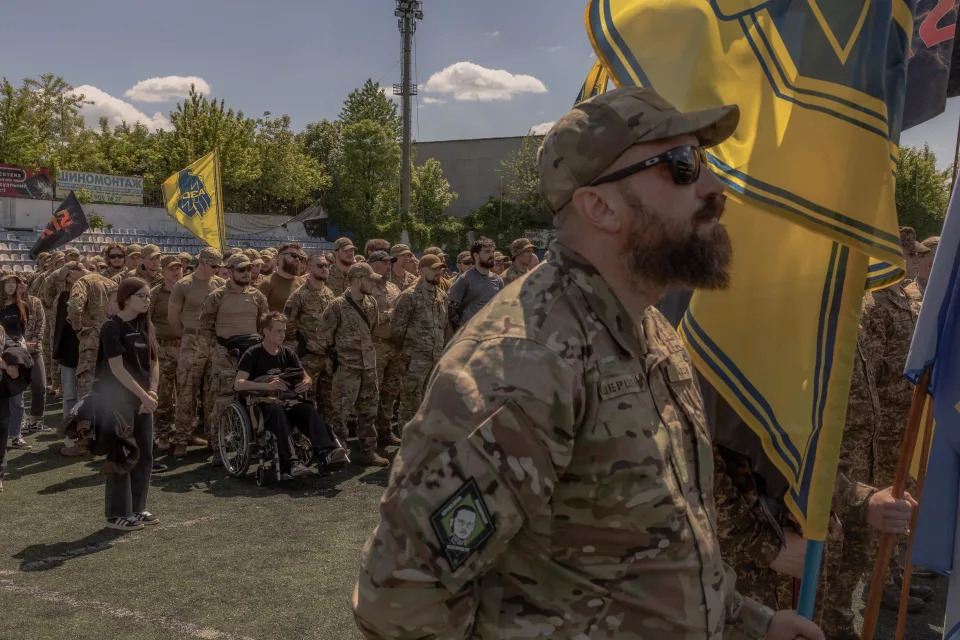
Members of the Azov Brigade attend the funeral of a member who was killed in battle, in Vinnytsia, Ukraine, May 10, 2024. / Credit: ROMAN PILIPEY/AFP via Getty Images
The Azov Brigade posted a statement on social media welcoming a "new page in the history" for the unit, saying that "obtaining Western weapons and training from the United States will not only increase the combat ability of Azov, but most importantly, contribute to the preservation of the lives and the health of personnel."
In 2022, Russia's top court officially designated the Azov unit a terrorist group, and speaking Tuesday in Moscow, Kremlin spokesman Dmitry Peskov told reporters that "such a sudden change in Washington's position shows that it will do anything to suppress Russia… even flirting with neo-Nazis."
Azov forces played a key role in defending the southern city of Mariupol, refusing to surrender for 80 days as they were holed–up in a sprawling steel mill with little ammunition and under blistering Russian artillery fire, before eventually laying down their weapons.
In Ukraine, the Azov troops have become a potent symbol of Ukrainian resistance in the war against Russia, and many remain in Russian captivity.
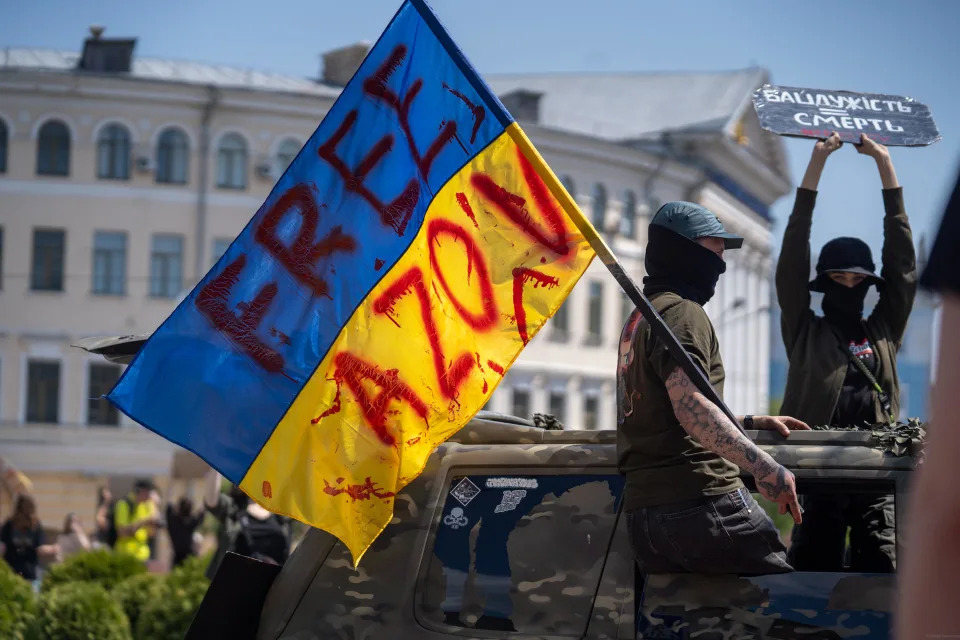
Activists and relatives of Ukrainian POWs hold up banners calling for the return of Ukrainian soldiers from Russian captivity during a rally on May 19, 2024 in Kyiv, Ukraine. / Credit: Oleksii Samsonov/Global Images Ukraine via Getty Images
–Camilla Schick contributed reporting.
US lifts weapons ban on Ukraine's Azov brigade
Jaroslav Lukiv - BBC News
Tue, June 11, 2024
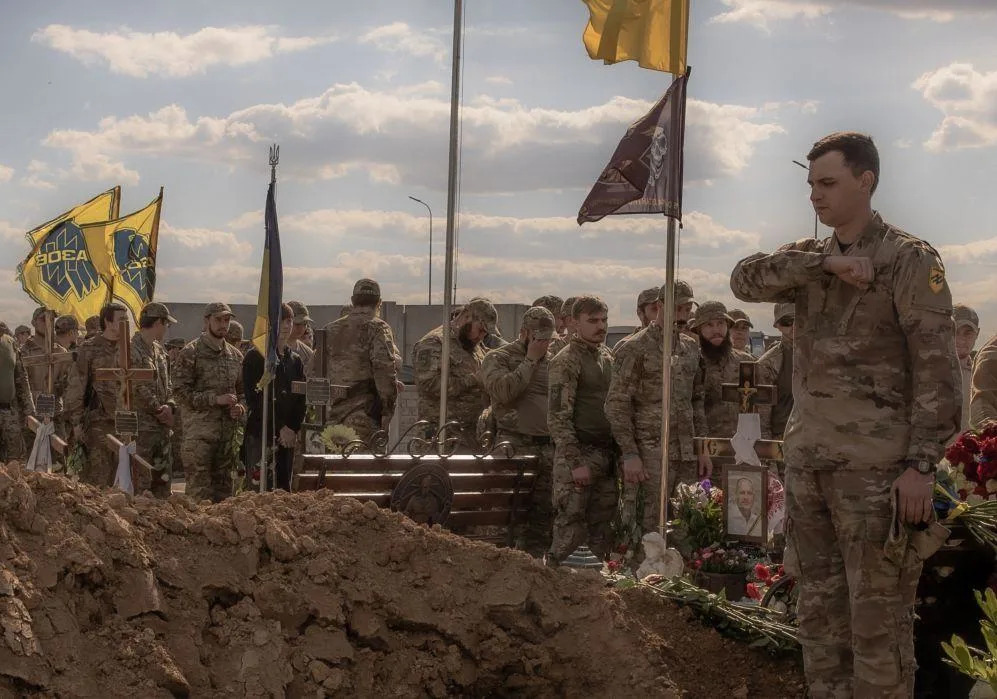
The US has lifted its long-standing ban on weapons supplies and training to Ukraine's Azov brigade, whose origins were mired in controversy over alleged links to far-right groups.
A state department spokesman told the BBC a vetting process "found no evidence of gross violations of human rights" by the brigade.
The Azov brigade, now a unit within Ukraine's National Guard, hailed the move, saying Russia's "lies... received a devastating blow".
Moscow condemned the decision, with Kremlin spokesman Dmitry Peskov saying the US was "even prepared to flirt with neo-Nazis" to suppress Russia.
Russian President Vladimir Putin has repeatedly made false claims about a "neo-Nazi regime" in Kyiv to try to justify first the annexation of Ukraine's southern Crimea peninsula and backing of pro-Moscow fighters in the east in 2014, and then his full-scale invasion launched in 2022.
Speaking on the condition of anonymity, the state department spokesman told the BBC that Washington applied a vetting process to the National Guard of Ukraine's 12th Special Forces Azov Brigade and "found no evidence of gross violations of human rights committed".
"Russian disinformation attempts to conflate Ukraine's National Guard Unit of 12th Special Forces Brigade Azov with a militia formed to defend Ukraine against Russia's invasion in 2014, called the 'Azov Battalion'," the spokesman added.
Under America's "Leahy Law", sponsored in 1997 by then-Senator Patrick Leahy, a finding that a foreign military unit has committed gross violations of human rights means it can be cut off from US military assistance.
The US government says it considers torture, extrajudicial killing, enforced disappearance and rape as such types of violations when implementing the law.
Reacting to the US decision, the Azov brigade said in a statement: "The lies about Azov, which the Kremlin regime have been spreading in the West for years, received a devastating blow today.
"Receiving Western weapons and training from the US will not only increase the combat capability of Azov, but most importantly, will contribute to the preservation of the lives and health of the personnel of the brigade."
A volunteer militia battalion called Azov was originally set up in May 2014 to fight Russian-backed forces in Ukraine's eastern Donbas region. Later that year it was briefly incorporated as a separate regiment in Ukraine's interior ministry before being transferred to the National Guard.
Some members of the original battalion were reported to have had links to far-right and ultra-nationalist groups at the time - but a number of them, including the first commander, later left the unit.
The US banned the regiment from receiving US weapons for the alleged links to the far right.
In 2016, a UN report accused the Azov regiment of "looting of civilian property, leading to displacement" in eastern Ukraine.
The current leadership of the Azov brigade says its members have no ties to far-right organisations or any other extremist groups - a claim that has not been independently verified.
Azov fighters are seen by many in Ukraine as national heroes for defending for months the southern city of Mariupol from a brutal Russian assault.
The port on the Sea of Azov was eventually taken by Moscow in May 2022.
Many Azov soldiers are still being held by Russia as prisoners of war, amid accusations that the Ukrainians have been subjected to torture in captivity.
Associated Press
Updated Tue, June 11, 2024


- Soldiers of 12th Special Forces Brigade Azov of the National Guard pose for a photo at the 155mm self-propelled gun M109 Paladin at the front line, near Kreminna, Luhansk region, Ukraine, Sunday, Jan. 28, 2024. The U.S. has removed restrictions on the transfer of American weapons and training to a high-profile Ukrainian military unit with a checkered past, the State Department said on Tuesday, June 11, 2024.
(AP Photo/Efrem Lukatsky, File)
KYIV, Ukraine (AP) — The U.S. has lifted a ban on providing American weapons and training to a controversial Ukrainian military unit that was key to the defense of the major port city of Mariupol, the State Department said on Tuesday.
The Azov Brigade is among Ukraine’s most effective and popular fighting units but it has been dogged by its origins as a volunteer battalion that drew fighters from far-right circles and criticism for some of its tactics. The U.S. had banned the regiment from using American weapons, citing the neo-Nazi ideology of some of its founders.
The current members of the Azov Brigade, which has been absorbed into Ukraine’s National Guard as the 12th Special Forces Brigade, reject accusations of extremism and any ties with far-right movements. But the Kremlin has seized on the regiment’s origins in its efforts to cast Russia’s invasion as a battle against Nazi influence in Ukraine.
Kremlin spokesman Dmitry Peskov said Moscow took an “extremely negative” view of Washington’s decision. He described Azov as an “ultranationalist armed formation” and accused U.S. authorities of being “ready to flirt with neo-Nazis.”
U.S. law prohibits providing equipment and training to foreign military units or individuals suspected of committing gross human rights violations. The State Department said in a statement that it found “no evidence" of such violations.
“This is a new page in our unit's history,” the Azov Brigade wrote in a statement on Instagram. “Azov is becoming even more powerful, even more professional and even more dangerous for occupiers.”
“Obtaining Western weapons and training from the United States will not only increase the combat ability of Azov, but most importantly, contribute to the preservation of the lives and the health of personnel,” the statement said.
Up until the State Department’s decision, Azov was prohibited from sending fighters to Western military exercises or accessing weapons bought with American funds. Lifting the ban will likely bolster the brigade's fighting capacity at a difficult time during the war against Russia's invasion. Ukraine suffers from persistent ammunition and personnel shortages.
Years before Russia’s full-scale invasion of Ukraine in 2022, Human Rights Watch raised concerns about Azov, writing that credible allegations of egregious abuses had been made against its fighters.
Moscow has repeatedly portrayed the Azov as a Nazi group and accused it of atrocities, but has publicly given little evidence of the allegations. In 2022, Russia’s top court officially designated Azov a terrorist group.
The brigade grew out of a group called the Azov Battalion, formed in 2014 as one of many volunteer regiments created to fight Russia-backed separatists in eastern Ukraine. It quickly became a separate official unit under the Ministry of Internal Affairs and later a unit of the National Guard.
Since its first commander left in October 2014, the brigade says on its website, it has been “cleansing itself” of undesirable elements. It wasn't possible to ascertain whether the brigade has accomplished that. It has, however, tried to recast its public image away from the controversy surrounding its ultranationalist origins to that of an effective and skillful fighting force, and has shunned connections with controversial figures.
Azov soldiers played a key part in the defense of Mariupol, holding out in a siege and low on ammunition for weeks at the southern port city’s steel mill, despite devastating attacks from Russian forces in 2022.
They are hailed as heroes in Ukraine, remembered for defense of the sprawling plant that became a symbol of Ukrainian tenacity in the war against Russia, and people take to the streets for weekly rallies calling for the release of hundreds of Azov POWs who remain in Russian captivity.
___
Find more of AP’s coverage at https://apnews.com/hub/russia-ukraine
U.S. lifts weapons and training ban on Ukraine's Azov Brigade
Guest Author, Anhelina Shamli
Tue, June 11, 2024
The United States has lifted restrictions on providing weapons and training for the high-profile Ukrainian military unit the Azov Brigade. The U.S. State Department confirmed Monday that the unit, which has played a significant role in Ukraine's effort to repel the ongoing invasion launched by Russia in February 2022, could now be trained by U.S. military personnel and use U.S.-provided weapons.
The State Department's move reversed a decade-old prohibition imposed on the Azov forces under the Leahy Law, which prohibits the U.S. from supplying weapons or financial assistance "to units of foreign security forces where there is credible information implicating that unit in the commission of gross violations of human rights."
The State Department said it had concluded there was "no evidence of Gross Violation of Human Rights committed by the 12th Azov Brigade."
The Azov Brigade was initially a volunteer force that rose to prominence in 2014, when Russian forces first crossed Ukraine's eastern border and started seizing land. The following year, it was integrated into Ukraine's National Guard. It will now have access to the same U.S. military assistance as any other unit in the National Guard.
According to The Washington Post, U.S. assistance to the Azov unit was barred under the Leahy Law about a decade ago, over concerns about its founder, the ultra-nationalist Andriy Biletsky, and other members having Nazi sympathies. Some members of what was then known as the Azov Battalion were described as being far-right and xenophobic — a narrative that has been repeatedly promoted by Russian propaganda campaigns to justify the invasion of Ukraine.
The State Department did not say when the ban was lifted, but a spokesperson said Monday that the original unit had been disbanded years ago and that vetting of the current brigade had found no evidence of gross human rights violations, leading to the restrictions being dropped.

Members of the Azov Brigade attend the funeral of a member who was killed in battle, in Vinnytsia, Ukraine, May 10, 2024. / Credit: ROMAN PILIPEY/AFP via Getty Images
The Azov Brigade posted a statement on social media welcoming a "new page in the history" for the unit, saying that "obtaining Western weapons and training from the United States will not only increase the combat ability of Azov, but most importantly, contribute to the preservation of the lives and the health of personnel."
In 2022, Russia's top court officially designated the Azov unit a terrorist group, and speaking Tuesday in Moscow, Kremlin spokesman Dmitry Peskov told reporters that "such a sudden change in Washington's position shows that it will do anything to suppress Russia… even flirting with neo-Nazis."
Azov forces played a key role in defending the southern city of Mariupol, refusing to surrender for 80 days as they were holed–up in a sprawling steel mill with little ammunition and under blistering Russian artillery fire, before eventually laying down their weapons.
In Ukraine, the Azov troops have become a potent symbol of Ukrainian resistance in the war against Russia, and many remain in Russian captivity.

Activists and relatives of Ukrainian POWs hold up banners calling for the return of Ukrainian soldiers from Russian captivity during a rally on May 19, 2024 in Kyiv, Ukraine. / Credit: Oleksii Samsonov/Global Images Ukraine via Getty Images
–Camilla Schick contributed reporting.
US lifts weapons ban on Ukraine's Azov brigade
Jaroslav Lukiv - BBC News
Tue, June 11, 2024

The US has lifted its long-standing ban on weapons supplies and training to Ukraine's Azov brigade, whose origins were mired in controversy over alleged links to far-right groups.
A state department spokesman told the BBC a vetting process "found no evidence of gross violations of human rights" by the brigade.
The Azov brigade, now a unit within Ukraine's National Guard, hailed the move, saying Russia's "lies... received a devastating blow".
Moscow condemned the decision, with Kremlin spokesman Dmitry Peskov saying the US was "even prepared to flirt with neo-Nazis" to suppress Russia.
Russian President Vladimir Putin has repeatedly made false claims about a "neo-Nazi regime" in Kyiv to try to justify first the annexation of Ukraine's southern Crimea peninsula and backing of pro-Moscow fighters in the east in 2014, and then his full-scale invasion launched in 2022.
Speaking on the condition of anonymity, the state department spokesman told the BBC that Washington applied a vetting process to the National Guard of Ukraine's 12th Special Forces Azov Brigade and "found no evidence of gross violations of human rights committed".
"Russian disinformation attempts to conflate Ukraine's National Guard Unit of 12th Special Forces Brigade Azov with a militia formed to defend Ukraine against Russia's invasion in 2014, called the 'Azov Battalion'," the spokesman added.
Under America's "Leahy Law", sponsored in 1997 by then-Senator Patrick Leahy, a finding that a foreign military unit has committed gross violations of human rights means it can be cut off from US military assistance.
The US government says it considers torture, extrajudicial killing, enforced disappearance and rape as such types of violations when implementing the law.
Reacting to the US decision, the Azov brigade said in a statement: "The lies about Azov, which the Kremlin regime have been spreading in the West for years, received a devastating blow today.
"Receiving Western weapons and training from the US will not only increase the combat capability of Azov, but most importantly, will contribute to the preservation of the lives and health of the personnel of the brigade."
A volunteer militia battalion called Azov was originally set up in May 2014 to fight Russian-backed forces in Ukraine's eastern Donbas region. Later that year it was briefly incorporated as a separate regiment in Ukraine's interior ministry before being transferred to the National Guard.
Some members of the original battalion were reported to have had links to far-right and ultra-nationalist groups at the time - but a number of them, including the first commander, later left the unit.
The US banned the regiment from receiving US weapons for the alleged links to the far right.
In 2016, a UN report accused the Azov regiment of "looting of civilian property, leading to displacement" in eastern Ukraine.
The current leadership of the Azov brigade says its members have no ties to far-right organisations or any other extremist groups - a claim that has not been independently verified.
Azov fighters are seen by many in Ukraine as national heroes for defending for months the southern city of Mariupol from a brutal Russian assault.
The port on the Sea of Azov was eventually taken by Moscow in May 2022.
Many Azov soldiers are still being held by Russia as prisoners of war, amid accusations that the Ukrainians have been subjected to torture in captivity.
No comments:
Post a Comment